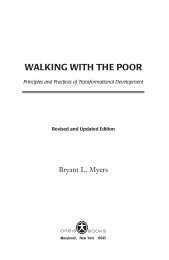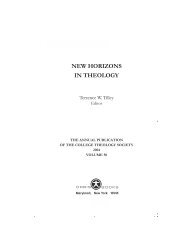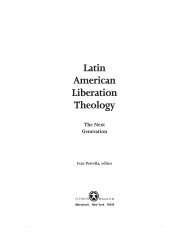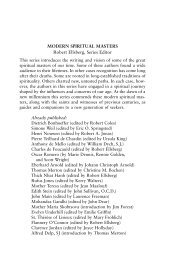CONCEPTS OF MISSION - Orbis Books
CONCEPTS OF MISSION - Orbis Books
CONCEPTS OF MISSION - Orbis Books
Create successful ePaper yourself
Turn your PDF publications into a flip-book with our unique Google optimized e-Paper software.
Mission in Contemporary Missiology 9<br />
Mission ad Gentes<br />
The development in mission theology after Vatican II has brought to the fore<br />
the importance of safeguarding the validity of mission ad gentes. The mission<br />
of the church is one; it is the same as Christ’s and the Spirit’s. Yet, it has its<br />
own specific activities to make it distinctive and particular. One of these specific<br />
activities is missio ad gentes. This aspect of the church’s mission is special<br />
and specific. Therefore, missio ad gentes must be safeguarded. It cannot<br />
be compromised. John Paul II does not accept that “evangelization” should<br />
replace “mission” (RM 34). In fact, “mission” must be kept. It has biblical<br />
and theological foundations and its own richness too.<br />
Moreover, in Vatican II mission theology, the term “mission” regained all<br />
its depth. When considered in the light of the Trinitarian mystery, the<br />
church’s mission finds its origin in the love of the Father and is the continuation<br />
of the mission of the Son and of the Holy Spirit (AG 2-5). Mission is<br />
not something abstract, but it is part of human history with its problems and<br />
values (AG 9, 11). The conciliar missionary decree Ad Gentes presents the<br />
evangelizing initiatives in territories dependent on the Roman dicastery and<br />
speaks of them as either places where Christ has not yet been announced or<br />
where the church is not sufficiently established. The decree adds: these “are<br />
generally called ‘missions’” (AG 6). Thus, the geographical term “missions”<br />
is not presented as something absolute. Again, what is referred to as “missionary<br />
activity” is a different activity from pastoral or ecumenical activity<br />
only for external reasons, that is, because of the means it uses and the goal<br />
it seeks. But all these activities “flow immediately from the very nature of the<br />
church.” A real specificity of the mission ad gentes is found in the response<br />
to a special call from the Spirit, who demands that they “go forth (exeunt)<br />
in faith and obedience to those who are far from Christ as ministers of the<br />
Gospel so that the offering up of the Gentiles may be sanctified by the Holy<br />
Spirit” (AG 23).<br />
In fact, Paul VI, in the exhortation Evangelii Nuntiandi, speaks of the<br />
“universal mission” with a geographical connotation (EN 50) and of the<br />
“missionary endeavor” as an activity different from the “new evangelization,”<br />
because it consists of a “first proclamation of Jesus Christ” addressed<br />
to those who have never heard the Good News (EN 51, 52). The exhortation,<br />
in particular, presents the “missionary action” of the church (EN 76).<br />
The church “born of such a mission [Christ’s mission] is sent” and called to<br />
“prolong and continue the saving mission of Christ himself in the power of<br />
the Holy Spirit.” Thus, the whole church has received the “mission to evangelize”<br />
(EN 15, 51). For this reason, the church has the obligation to keep<br />
alive its missionary spirit, and even more to intensify it in the historical<br />
moment in which we live. This is a responsibility which the church has for<br />
all of humanity (EN 53). In other words, the term “missions” as used here<br />
by Paul VI refers to the geographical sense of the word, as in the conciliar
















